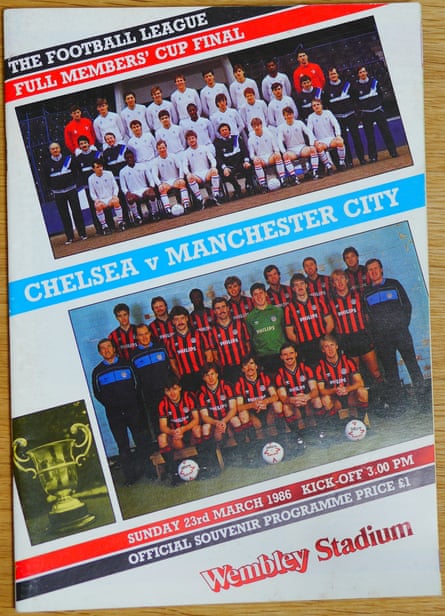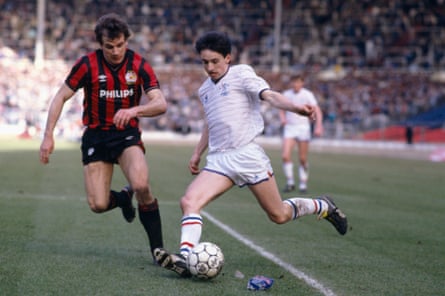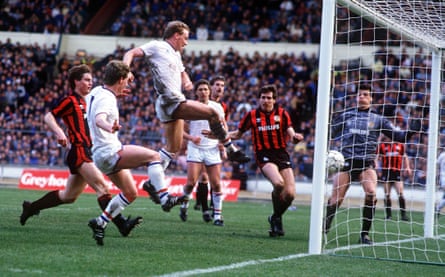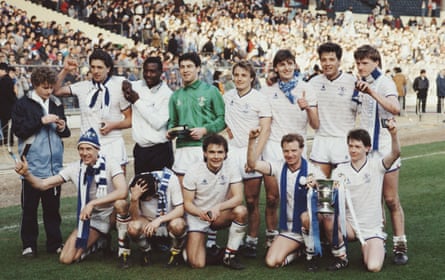English football was constantly hitting new levels of rock bottom in 1985. Fans were violent, stadiums were decaying and attendances were dropping across the country. The European ban imposed was the inevitable conclusion to the spreading English disease that had swept the continent. Slightly less football during the 1985-86 season might not have been a bad thing but the Football League and club chairmen had different ideas; greed was good, so two new competitions were introduced to the calendar.
Step forward the Screen Sport Super Cup and the Full Members’ Cup. The former was set up as a consolation competition for the six teams that had qualified for Europe but could not participate due to the ban. Look deep enough and you can see some logic in offering an alternative event for European qualifiers. But the Full Members’ Cup was a complete mystery.
Sir Norman Chester, who had been asked by the government and Football League to investigate English football, summed things up nicely: “What is this Full Members’ Cup? Like that Freight Train thing but for bigger clubs, is it? How absurd.” Chester had proposed to cut fixtures to improve the quality of the product but, unsurprisingly, his suggestions fell upon deaf ears. Now more matches were being added to the season, a move that left Bobby Robson “sad and bitterly disappointed” in the build-up to the Mexico World Cup.
It soon became apparent that not many clubs were embracing the new competition. Originally opened up to 32 teams in the top two divisions, invites were declined at an alarming rate. Just Say No was a hit for the Grange Hill kids in April 1986, but it could also have been the motto for the Full Members’ Cup in August and September of 1985.

Arsenal, Watford and West Ham were among the first to politely reject the chance of adding the Full Members’ Cup to their trophy cabinets. With more clubs falling by the wayside, the Football League were facing the prospect of a humiliating U-turn. The draw was delayed when Crystal Palace chairman Ron Noades complained about the Football League’s plan to have all of the fixtures bar the final completed by Christmas. When the competition got under way, there were only 21 participants. Birmingham City pulled out on the day they were meant to play Bradford in their opening fixture, with club secretary Andrew Waterhouse explaining: “When three more clubs pulled out, we felt the competition had been devalued even further and was no longer an attractive proposition for our supporters.”
The tournament kicked off on September 17 with absolutely no fanfare whatsoever. Emlyn Hughes poked fun at it in his Mirror column, calling it the Few Members’ Cup and the Fools Members’ Cup, and fans were equally unimpressed. Even in an era of declining attendances, some of the gates were staggering. Some teams set unwanted records for their lowest ever attendances in competitive matches: Manchester City (4,029 v Leeds), Coventry (1,066 v Millwall), Fulham (2,022 v Oxford). It was reported that just 12 Shrewsbury fans made the midweek trip to Oxford; in a crowd of just 1,898, the away fans were outnumbered by the nine policemen and four stewards who were there to look after them.
Manchester City won their group by thrashing Leeds 6-1 – with new signing Gordon Davies claiming a hat-trick in his second match – and then beating Sheffield United 2-1 thanks to a last-minute goal from Graham Baker. After winning their group, City had to play a regional semi-final and final to reach Wembley.
They saw off Sunderland in a penalty shootout in the semi-final – goalkeeper Eric Nixon proving the hero – and then beat Hull over two legs in the Northern Final. After losing the first leg 2-1, a bumper crowd of 10,108 turned up at Maine Road to witness a dramatic 2-0 win as the 3-2 aggregate victory was secured in the very last minute by Jim Melrose. “Our fans deserve a Wembley occasion,” said City manager Billy McNeill.

Chelsea, one of only five top flight teams to enter the competition, won their group convincingly, beating Portsmouth 3-0 thanks to goals from John Bumstead, Micky Hazard and Kerry Dixon, before two goals from Pat Nevin and one from David Speedie gave them a 3-1 win at Charlton.
Chelsea also needed penalties to win their regional semi-final. They came from 2-0 down against West Brom to force a shootout, where Garth Crooks was only man to miss from the spot. In their regional final against Oxford, Chelsea had Keith Jones sent off in the first half but Dixon scored a hat-trick in a thumping 4-1 win, making Oxford’s 1-0 win in the return fixture irrelevant.
With the finalists decided before Christmas, both clubs could now look forward to a special day out. But the road to Wembley was far from smooth. The final was originally scheduled for Saturday 1 March, but Oxford put a spanner in the works when they complained that their league fixture at City that day should not be cancelled. The Football League sided with Oxford and yet again the Full Members’ Cup was thrown into turmoil.

Manchester City chairman Peter Swales was furious. “I am amazed and shattered by the decision, more so as both the League and FA said we could go ahead on 1 March.” The news that the match may be switched to Wednesday 19 March was a crushing blow. “By playing on a Wednesday evening, it will make a difference of some 20,000 on the gate, from about 60,000 to 40,000,” Swales complained.
All of a sudden, passions started to run high. Police were called to Oxford’s ground after they were sent a brick, which was wrapped in a note saying the offices “would be burned to the ground.” A number of angry fans also left angry messages on Oxford’s answerphone.
A solution was reached, although it was not entirely satisfactory. The final was scheduled for Sunday 23 March. On the plus side, playing the game at the weekend would boost the attendance. However, both teams had league matches the day before – for City this meant playing a Wembley final 24 hours after a Manchester derby. In the end, both teams came out of their league matches in good shape. Chelsea won 1-0 at Southampton to stay in the title race and City came from 2-0 down to draw at Old Trafford.

Unlike a lot of what had gone before, the final proved to be a rare success. A healthy crowd of 67,236, bringing in receipts of £508,000, enjoyed an exciting game, with Chelsea coming out on top in a nine-goal thriller. City took the lead after Steve Kinsey deflected a Mick McCarthy shot past Steve Francis, but from this point on it was the David Speedie and Colin Lee show.
A Nevin cross allowed Speedie to head in the equaliser, with Lee putting Chelsea 2-1 up before the break. Speedie went on to complete a Wembley final hat-trick and a long-range effort from Lee put Chelsea 5-1 up and seemingly out of sight. City went down fighting, though. Two goals from Mark Lillis either side of a Doug Rougvie own goal gave the scoreline a more respectable look.
As Chelsea skipper Colin Pates climbed the Wembley steps to pick up the Full Members’ Cup, many onlookers wondered if he would be the first and last man to do so. Somehow the competition limped on for another six seasons, earning sponsorship deals with Simod and Zenith Data Systems along the way. But as soon as the sparkling new Premier League came along, there was no room for an ugly relative like the ZDS Cup. Yet, search down the bottom of Chelsea’s trophy cabinet web page and you can still a mention of their 1986 triumph.

Comments (…)
Sign in or create your Guardian account to join the discussion